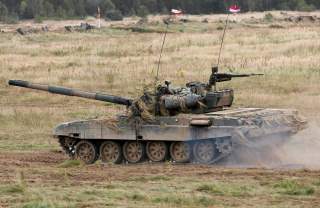This Is How Poland Would Stop A Russian Invasion (Could Warsaw Win?)
It would be a grueling battle.
Various modernizations to the PT-91 fleet have been proposed to make them more competitive, including replacement of the main gun with an autoloaded Ukrainian L/50 KMB-2 120-millimeter cannon or Slovak 2A46MS 125-millimeter cannon, additional armor arrays, new more powerful engines, APUs and better optics. These updates are not being pursued in any official capacity yet, as they would be rather expensive for relatively little gain in combat efficiency.
In the end, the only tank in the Polish fleet right now that could attempt to fight Russia’s best is their fleet of Leopard 2A5s. Even then, with the ammo produced it is a stretch to say that they would be able to effectively engage head-on. PT-91s could prove to be an effective second-line tank, however. Their primitive fire control system and armor limit their ability to fight on the move. Russian tank superiority could be offset by the heavy use of Spike missiles on the defensive by Poland. The Leopard 2PL along with acquiring additional stocks of surplus 2A4s to modernize to that standard could prove to be the bulwark of a new Polish tank fleet, but that modernization is not yet formalized.
(Information about ERAWA was taken from Adam Wiśniewski’s book Pancerze - Budowa, Projektowanie i Badanie. Information about ammunition was taken from Jane’s Ammunition Handbook and PHO/Mesko Amunicja Product Brochures. Polish tank fleet strength was taken from Jane’s: World Armies, 2018 edition. Other information was provided by Raport - Wojsko - Technika - Obronność, Nowa Technika Wojskowa, and Poligon.)
Charlie Gao studied political and computer science at Grinnell College and is a frequent commentator on defense and national-security issues. He would like to thank Michał Kizeweter for significant assistance with research. This article first appeared last year.
Image: Reuters.

